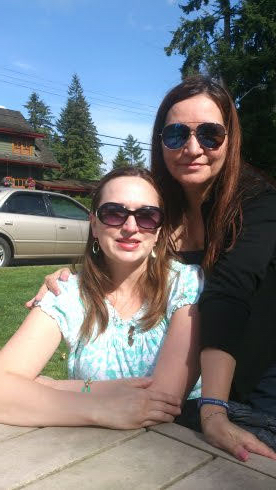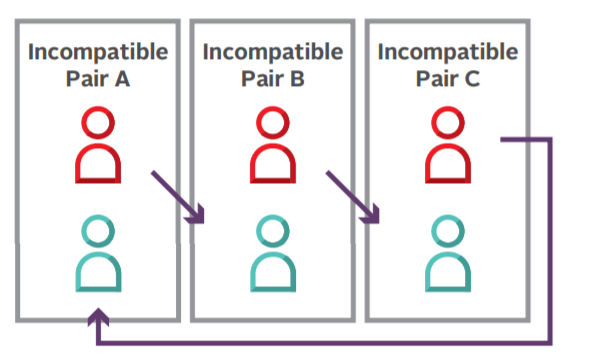National Organ and Tissue Donation Awareness Week (NOTDAW) takes place April 18 to 24, 2021. It raises awareness about the critical need for more donors across the country and encourages Canadians to register their decision and to talk to their loved ones about organ donation.
There was never any hesitation for Tara Martin when her sister Kim needed a kidney…not once, but twice. Tara, a project manager at the Centre for Health Evaluation and Outcome Sciences, went through the process to be a living kidney donor both times Kim went on the transplant list.
Tara grew up watching her sister battle illness. Kim finally received her diagnosis, three years after she started getting sick, when the family moved from Alberta to Toronto to access specialized medical care at SickKids Hospital. She was the youngest pediatric case of Wegener’s granulomatosis — now called granulomatosis with polyangiitis — in Canada at the time. The rare disease slows blood flow to some of the organs.
“It was terrifying to watch my little sister suffer, not able to live a full active childhood,” recalls Tara. “I could feel my parents’ anguish and constant fear and worry for her health.”

But Kim persevered, and with treatment, she was able to live a normal life until the disease eventually destroyed her kidneys. She had to start dialysis in 2000 when she was 22 years old. That’s when Tara and their parents all volunteered to be living donors. “I immediately knew I wanted to give my sister one of my kidneys as quickly as I could; of course, my mother Katherine felt even more strongly that it come from her first. We both did the full testing and were both perfect matches.”
Kim received a new kidney from her mom in August 2001. Katherine, now 63, is in excellent health. She says, “Donating my kidney was one of the most rewarding experiences of my life and I would gladly do it again if I could.”
For 13 years, the transplant gave Kim and her family an opportunity to live a normal life. But then suddenly, her kidney function dropped dramatically and she had to go back on dialysis. This time, it was completely debilitating. Kim remarks, “A lot of people think dialysis is a viable option. But it just gives you the bare minimum of health to keep you alive. I struggled the entire time with many complications, including extremely high blood pressure that eventually led to blood transfusions.”
Kim’s first transplant, plus the blood transfusions, now put her in a precarious situation for a second kidney transplant. Her body had developed many antibodies, which meant her immune system was highly sensitized. This greatly increased her risk of rejecting a subsequent transplant and made it very difficult to find a suitable donor match.
Tara was willing to step forward as a living donor once again, though it was a bit more complicated this time. Now, she was no longer a match. Fortunately, Canadian Blood Services had developed two new national programs in the time since Kim’s first transplant. A recipient with an incompatible donor can join the Kidney Paired Donation Program, with the goal of finding a match with other unmatched pairs, as part of what is called a donor chain. The second program is the Highly Sensitized Patient program. It places highly sensitized patients, like Kim, who need a very specific match on a cross-country registry, giving them first access to all donors. Kim was put on that while her sister went through the living donor process.

Tara also had to consider her own family now. She and her husband and two children had family discussions to make sure everyone was on board with what was happening. Tara says she was reassured that if she ever needed a kidney in the future, she would be placed at the top of the list. Overall, Tara describes the medical process as ‘quite pleasant’. “The team and testing are comprehensive. If anything was not normal, they fully investigated. I actually learned a lot about my physical and emotional self on this journey.”

After delays because of Kim’s declining health and additional testing for Tara, the sisters were entered into the paired exchange database in October 2018. Tara was confident her sister’s match would come soon. She had just started working at St. Paul’s Hospital and even told her manager that she would likely need time off at some point in the near future to donate a kidney.
At the St. Paul’s Foundation’s annual Lights of Hope a month later, Tara remembers feeling full of hope, “I went to the lighting event and heard a story about someone who had received a heart transplant. I was so optimistic. Shortly after that, the call came for Kim. Miraculously, there was a deceased donor from Ontario who was a perfect match. I was at work when I found out. The whole office was cheering!”
“It was probably the best day of my life,” says Kim. “By the time I had the transplant, I didn’t think I would live much longer.” Now 42 years old, Kim says she thinks about her deceased donor all the time, and she knows she has been very lucky, not once, but twice. “I met a lot of people on dialysis who had family who didn’t want to donate. Some even had many siblings or children, but none of them were willing to come forward. And then they had to wait years on dialysis for a deceased donor. Some of them died while waiting.”
Though Tara did not end up donating a kidney, she says she hasn’t ruled it out in the future. Her sister may need a third kidney transplant, or she might consider donating anonymously. “It was like a calling, and I felt some guilt about stepping back after all the testing and going through the whole process.”
The sisters want to encourage everyone to think about organ donation, and take that first step of signing up on the organ donor registry. For anyone interested in living donation, Tara suggests taking the first step and having an initial phone call with the living donor program. She adds, “You will know if it’s within your comfort zone. The process is step wise and the first step is easy — consent, questionnaires and a blood test. Testing is thorough and confidential and you can always change your mind at any timepoint.”
Organ donation has forever changed this close-knit family. Tara says, “Kim’s health and transplant journey has been an emotional roller coaster for all of us. We had the constant fear of losing her, though my sister is a fighter, and she’s tough, and I have always known she would be ok. The experience has definitely united our family.”
Editor’s note: Kim did not want her last name or photo used for this story to protect her privacy.



